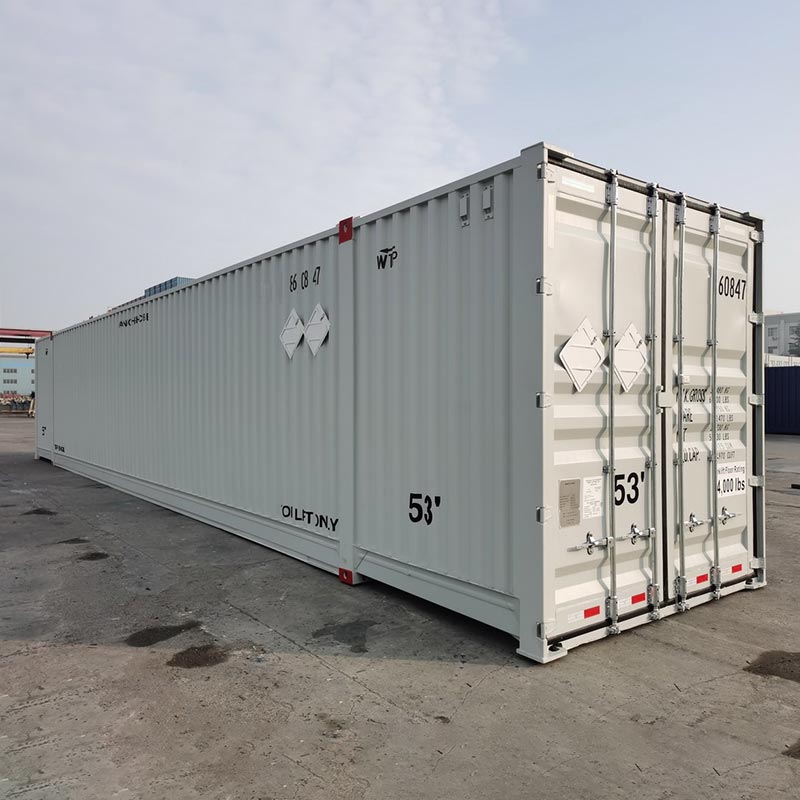
 English
English  简体中文
简体中文 Español
Español Português
Português русский
русский Français
Français 日本語
日本語 Deutsch
Deutsch tiếng Việt
tiếng Việt Italiano
Italiano Nederlands
Nederlands ภาษาไทย
ภาษาไทย Polski
Polski 한국어
한국어 Svenska
Svenska magyar
magyar Malay
Malay বাংলা ভাষার
বাংলা ভাষার Dansk
Dansk Suomi
Suomi हिन्दी
हिन्दी Pilipino
Pilipino Türkçe
Türkçe Gaeilge
Gaeilge العربية
العربية Indonesia
Indonesia Norsk
Norsk تمل
تمل český
český ελληνικά
ελληνικά український
український Javanese
Javanese فارسی
فارسی தமிழ்
தமிழ் తెలుగు
తెలుగు नेपाली
नेपाली Burmese
Burmese български
български ລາວ
ລາວ Latine
Latine Қазақша
Қазақша Euskal
Euskal Azərbaycan
Azərbaycan Slovenský jazyk
Slovenský jazyk Македонски
Македонски Lietuvos
Lietuvos Eesti Keel
Eesti Keel Română
Română Slovenski
Slovenski मराठी
मराठी
How much do you know about Special Container?
2025-08-29
Special Container refers to a type of container designed to meet the needs of specific cargo transportation or special operations. Compared with ordinary standard containers, they are specially optimized in structure, material or function, and can adapt to more complex transportation environments and professional field needs. What are the types of special containers and what are their characteristics? Let's learn about them with Container Family.

Main types of special containers
(1) Refrigerated containers
Refrigerated containers are equipped with a refrigeration system, and the internal temperature can be adjusted to between -30℃ and +30℃. They are suitable for transporting frozen food, fresh agricultural products or medicines that need to be kept at a constant temperature. The box body uses a polyurethane foam insulation layer, and a sealing strip is installed at the door seam to reduce cold air leakage.
(2) Open-top container
Special container with a fully or partially open top is convenient for loading and unloading oversized cargo such as large machinery, steel structures, etc. by crane. The side panels of the box body are usually made of corrugated steel, and the top is covered with waterproof canvas to prevent rainwater from intruding.
(3) Tank container
Stainless steel tank designed for liquid or gas transportation, which can carry food-grade liquids (such as cooking oil), chemicals (non-hazardous goods) or dry powders and granular materials. The interior of the tank is polished or anti-corrosion treated according to the needs of different goods, and the external frame conforms to the standard container size.
(4) Frame container
It has a side wall design with only a bottom frame and four corner pillars, which is suitable for transporting extra-wide and extra-high heavy equipment such as generators and transformers. The load capacity can reach 40 tons, and the bottom is covered with anti-skid steel plates.
Core technical features of special containers
(1) Material upgrade
Some special containers are made of high-strength weathering steel or aluminum alloy, which is 20% lighter than ordinary steel containers while maintaining the same load-bearing capacity.
(2) Intelligent monitoring system
The new refrigerated container is equipped with a remote temperature control device, which can transmit temperature and humidity data in real time through sensors; the dangerous goods transport box is equipped with a gas leak alarm and GPS positioning module. (3) Standardized Adaptation
Despite their special functions, all special containers still strictly follow the outer dimensions of ISO international standards to ensure compatibility with port cranes and ship spaces.
FAQ
Q1: Can Special Containers be mixed with ordinary cargo?
A: Except for flatbed containers, most special containers require special use. For example, loading ordinary cargo in a refrigerated container may cause refrigeration system damage, and mixing different liquids in a tank container may cause contamination.
Q2: How much higher is the transportation cost than that of an ordinary container?
A: Depending on the type, the freight is usually 30%-200% higher.
Q3: How to determine whether a cargo requires a Special Container?
A: The cargo characteristics (such as temperature sensitivity, shape), transportation distance and environmental conditions need to be comprehensively considered. It is recommended to use a refrigerated container for perishable cargo transported for more than 72 hours, and a flatbed container is required for cargo weighing more than 25 tons.
Precautions for use
(1) Inspection before loading
Refrigerated containers must be pre-cooled 24 hours in advance. Tank containers must confirm the cleaning certificate of the last transport residue. Open-top containers must check the integrity of the waterproof cloth.
(2) Management during transportation
The loading capacity of tank containers should be controlled at 80%-95% of the volume to avoid liquid shaking and uneven force on the container body; frame container cargo should be fixed to the bottom frame corner fittings with tie straps.
(3) Maintenance requirements
Special containers need to undergo professional inspections every year, such as refrigerant pressure testing for refrigerated containers and non-destructive testing of the inner wall of tank containers.



